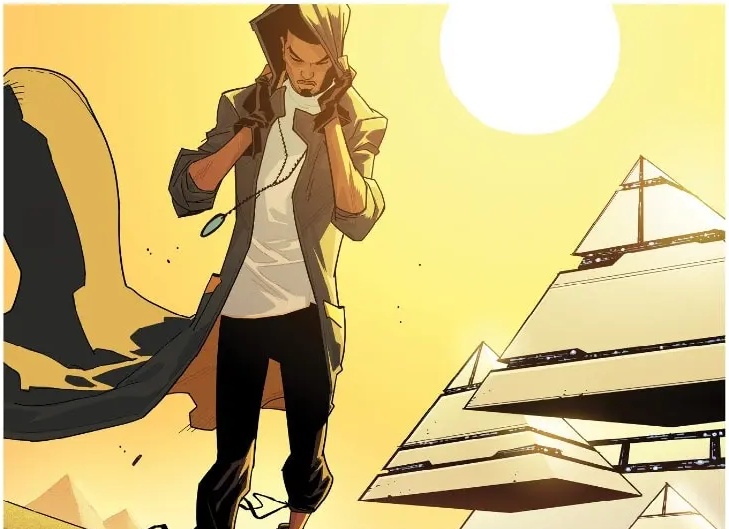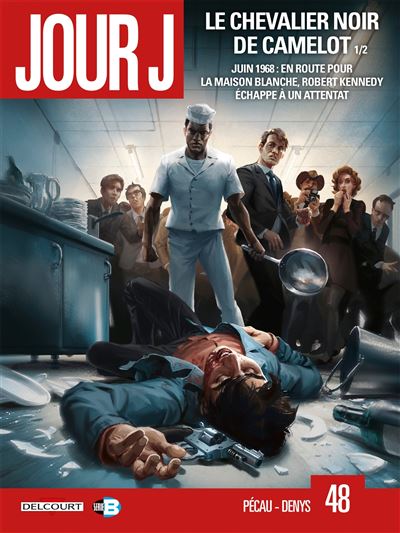Forget Doctor Strange, the future of magic is in Excellence. This first volume by Brandon Thomas and Khary Randolph creates a new image of occult art between action and Afrofuturism.
The story of a rebel
 In Excellence, magic exists but it is not accessible to everyone. It is mainly transmitted from father to son through a long and rigorous teaching. Magic is therefore the well-kept secret of an elite that supervises it from training in moral rules to shaping chopsticks. Spencer Raymond Dales, heir to a long and powerful family of occultists will finally join the Aegis, a secret society of black magicians. Once a magician, Spencer will be the godfather of a human and will have to ensure that nothing serious happens without ever making himself known. Magicians are therefore the invisible hand that helps godchildren. By passing the test, Spencer finally achieves his father's goals. However, he is closer to his grandmother and tries to follow her wise advice. But when she gets sick, he wants to treat her illegally by magic, but her father refuses to follow the rules. Spencer is not an endearing hero. Coming from one of the ten lines of magicians, he remains a son of the black bourgeois who wants more power. His parents lecture him but they let him. This beginning is deceptive and the action accelerates in the second part. Nevertheless, the narrative sometimes becomes difficult to follow through confusing dialogue.
In Excellence, magic exists but it is not accessible to everyone. It is mainly transmitted from father to son through a long and rigorous teaching. Magic is therefore the well-kept secret of an elite that supervises it from training in moral rules to shaping chopsticks. Spencer Raymond Dales, heir to a long and powerful family of occultists will finally join the Aegis, a secret society of black magicians. Once a magician, Spencer will be the godfather of a human and will have to ensure that nothing serious happens without ever making himself known. Magicians are therefore the invisible hand that helps godchildren. By passing the test, Spencer finally achieves his father's goals. However, he is closer to his grandmother and tries to follow her wise advice. But when she gets sick, he wants to treat her illegally by magic, but her father refuses to follow the rules. Spencer is not an endearing hero. Coming from one of the ten lines of magicians, he remains a son of the black bourgeois who wants more power. His parents lecture him but they let him. This beginning is deceptive and the action accelerates in the second part. Nevertheless, the narrative sometimes becomes difficult to follow through confusing dialogue.
Excellence, the story of a reprobate
Spencer's father is a wealthy wizard who does everything for his son's success: he feeds him spells when he is a baby, then begins his training at the age of four and, a year later, gives him a wand from his ancestors. But his powers are slow to manifest and Spencer becomes the shame of the family. He does not live up to his father's expectations and the latter makes it clear to him. The son experiences intense internal shame that turns to anger as he grows up without magic. Overflowing with anger and frustration, his hatred explodes causing the appearance of his power. But this shame is also social. More broadly, it is the entire society of magicians that despises Spencer for his "disability". The reader thinks of the racism that provokes internal and external violence in communities. Moreover, the undeserving and women are excluded from magic and the world is organized around a caste society. The hero being black, Excellence raises the question of the representation of minorities in popular culture. The character announces that not all fairy tales were made for him. Dales refers to boys devoid of magic but the reader necessarily thinks of minorities in the real world. Conversely, his grandmother told him: "If you are beautiful, you feel good, and if you feel good, you are good. Moreover, Khary Randolph's stylized drawing by highlighting strength and respect is perfectly in this subject. By its very angular features close to cartoons or even tags, its style is reminiscent of Bitter Root. Excellence is also set in a post-Black Panther period that has profoundly changed the representation of black heroes in popular culture: Aaron looks like Killmonger and Spencer looks like Creed.  Excellence even seeks to create another mythology by highlighting new references. In the houses of Dales one can see paintings of African landscapes and Norman Rockwell's famous painting on segregation. A character reads Invisible Man, for whom do you sing? by Ralph Ellison. Brandon Thomas and Khary Randolph thus continue the current of Afrocentrism defined in the 90s . Science fiction has long ignored minorities, artists have wanted to give a future to their community by integrating non-Western references. For example, the city is a floating pyramid Delcourt offers with Excellence an original story of formation. Not only can we see a black hero but Brandon Thomas and Khary Randolph offer a whole universe out of Western inspirations. Moreover, it is rare to see a hero so unpleasant by his arrogance. Like a rap classic, a break changes in the middle of the track propelling the narrative towards social revolution. We move from the birth of a rebel of anger, to intellectual formation. If our introduction bothered you, discover on this link that JustFocus still loves the wizard of Marvel as well as a review on volume two of Bitter Root.
Excellence even seeks to create another mythology by highlighting new references. In the houses of Dales one can see paintings of African landscapes and Norman Rockwell's famous painting on segregation. A character reads Invisible Man, for whom do you sing? by Ralph Ellison. Brandon Thomas and Khary Randolph thus continue the current of Afrocentrism defined in the 90s . Science fiction has long ignored minorities, artists have wanted to give a future to their community by integrating non-Western references. For example, the city is a floating pyramid Delcourt offers with Excellence an original story of formation. Not only can we see a black hero but Brandon Thomas and Khary Randolph offer a whole universe out of Western inspirations. Moreover, it is rare to see a hero so unpleasant by his arrogance. Like a rap classic, a break changes in the middle of the track propelling the narrative towards social revolution. We move from the birth of a rebel of anger, to intellectual formation. If our introduction bothered you, discover on this link that JustFocus still loves the wizard of Marvel as well as a review on volume two of Bitter Root.






































